Giant strides that keep pace with set plans
By Demola Abimboye
When he assumed office as governor on May 29, 2019, the people’s expectations were high. Everywhere and every government office he visited in his first few days in power, the sing-song from civil servants and Lagosians generally was “San’wo Eko, San’wo Eko,” which means “Pay Lagosians Money.” It was not that his predecessors owed the workers’ salaries or emoluments but a demonstration of the hope they had that his tenure should be more remarkable and prosperous for them than those of Bola Ahmed Tinubu, BAT, Babatunde Raji Fashola, BRF, and Akinwumi Ambode, AA, the three men who had governed the state before him. The new helmsman could not afford to do less.
But at the point he took over power, Lagosians had become despondent due to the deteriorating situation in the state. Politicking had overshadowed governance in the preceding months. Refuse heaps had sprung up and decorated most streets menacingly. The environment was no longer healthy. The traffic situation had become chaotic with motorists meandering dangerously on pothole-riddled roads. The gridlock on most roads, especially those leading to the Apapa and Tin Can Island Ports, had slowed down economic activities. It was obvious that Lagos needed urgent repair.
Mr. Babajide Olusola Sanwo-Olu, as he chose to be addressed after being sworn in as the governor, knew the state yearned for repair and that the task was herculean. He seemed prepared for the job, having garnered considerable experience since he moved into the state’s corridors of power at 38. He was first appointed Special Adviser on Corporate Matters to the then Deputy Governor of Lagos State, Mr. Femi Pedro in 2003 and later Special Adviser on Corporate Matters to Governor Tinubu. His outstanding performance later earned him the position of Acting Commissioner for Economic Planning and Budget. Early in 2007, he became the Commissioner for Commerce and Industry.
When Fashola took over as governor in May 2007, he appointed Sanwo-Olu as Commissioner for Establishments, Training and Pensions. And in 2016, Ambode made him the Managing Director/Chief Executive Officer of the Lagos State Development Property Corporation, LSDPC.
Against this rich background, Sanwo-Olu knew what to do. In his inaugural speech (see box) on May 29, 2019, he promised the people a “Greater Lagos.” But he was quick to call on those expecting dividends of democracy to help work for it: “I ask you to join me on this journey to awaken a Greater Lagos. When we speak of a Greater Lagos, we speak not empty words. It is a deep and profound assertion we mean,” he said.
And he added: “Posterity has given us this day to commence our journey to greatness. We need to envision the glorious end of working together, tirelessly and committedly, towards achieving a Lagos of our dreams. By our individual and collective efforts and the Grace of God, these dreams will become a reality.
“In Lagos State, our story has been of successes and achievements. Since 1999, our tradition of progressive governance has set Lagos apart and strengthened people’s belief in our ideology. And that is the very reason I stand before you on this historic day as your Governor. While we celebrate the victory of progressive governance and democracy, tomorrow we must be ready to stand on guard and be fully vigilant.”
To allay the people’s fears, Sanwo-Olu spoke sure-footedly: “The Deputy Governor, Dr. Kadri Obafemi Hamzat, and I are single-minded in our desire to bequeath to our successors a far Greater Lagos than the one we inherited today. We have formulated a concise framework that encapsulates our collective vision for the state and ensures that our undertaking remains focused and our communication remains clear as we endeavour to build a Greater Lagos we can all be proud to call home. The framework, as our six Pillars of Development Agenda, is captured by the acronym, T.H.E.M.E.S.”
He explained each pillar briefly:
• T – Traffic Management and Transportation: a master plan that will fully integrate road, rail and water transportation into a multi-modal transport system that makes commuting easy for Lagosians and compliance with all traffic rules and regulations on roads.
• H – Health and Environment: clean environment in preventive healthcare, a moral duty to provide basic health care for the people especially those who cannot afford it; a comprehensive health programme with special emphasis on maternal healthcare, malaria and water borne diseases; focus on sanitation and waste management by ensuring that drainage systems are functional and kept clean.
• E – Education and Technology: investment in the education of our children and young adults through increased budgetary allocation to education; empowerment of teachers in every local government and strengthening their capacity to deliver quality education; new educational infrastructure that prepares children for a new world that demands creativity, intuition and critical thinking; integration of technology into school curriculum and empowerment of youths with the much-needed skills for the jobs of tomorrow.
• M – Making Lagos a 21st Century Economy: investing in critical infrastructure to accelerate economic growth and empowering the private sector that is the real engine of growth.
• E – Entertainment and Tourism: nurturing and showcasing Lagos’ cultural heritage and unique hospitality; support for entertainment, visual arts and sports sectors, and inspiring the kind of creativity from talented individuals that will enhance reputation at home and abroad.
• S – Security and Governance: creating the right environment in which security and safety of lives and property are guaranteed and that Lagos State remains one of the top destinations on the African continent to live, work and invest in.

Now, after two and a half years in the saddle, Babajide Olusola Sanwo-Olu, BOS, is gradually presenting a score card of purposeful leadership which is evident in all parts of Lagos State. He seemed to have refused to be lost in the euphoria and blitz of celebration of victory at the polls in which 63 political organisations were ranged against him. Since 2019, the new helmsman has been using the THEMES template to transform the state, much to the admiration and even beyond the imagination of many Lagosians. He is gradually turning the state into a better megapolis with world class infrastructure and other social amenities.
Barely 24 hours in office on May 30, 2019, Sanwo-Olu signed the first Executive Order on “Indiscriminate Refuse Dumping, Traffic Management and Public Works.” The Order entailed traffic control and management, fixing of potholes, sanitation as well as cleaning drainages in the state. To execute it, the governor expanded the Olusosun dump site at Ojota to 42 acres to accommodate more waste and increase truck turnaround time. A resource centre has since been built and commissioned at the site to train and retrain staff as well as create more jobs through waste recycling by the Lagos Waste Management Authority, LAWMA.
This was followed with a 4am programme for refuse collection by LAWMA operatives to stem indiscriminate refuse disposal across the megapolis. The Authority procured a Briquette facility that can process about 1,700kg of sawdust per hour in Agbowa, Ikorodu, while it launched the Lagos State Blue Box Recycling at the Simpson Loading Station on Lagos Island.
For a cleaner Lagos, Sanwo-Olu has complemented over 850 Private Sector Participants, PSP, compactor trucks by donating 30 units of 12-cubic meter trucks, 60 units of 24-cubic meter trucks and 12 hook loaders to enhance service delivery in under-served communities across the state.
The traffic management aspect of the order extended the working hours of operatives of the Lagos State Traffic Management Agency, LASTMA, to 11pm in two shifts with better remuneration.
Within the first half of his first term, the Administration has completed many ongoing transportation and traffic infrastructural development projects he inherited and initiated new ones in its bid to bring comfort and succour to the people. These include ramp and road networks, Lagos-Ogun Boundary Roads Phase II, Lekki Oniru Traffic Circulation Projects, network of roads in Ojokoro, Somolu and Ikoyi and the Pen Cinema, Agege Fly Over, among others.
At the commissioning of the Pen Cinema infrastructures, Sanwo-Olu said that his administration opted to complete the “precast and pre-stressed reinforced concrete dual carriage flyover and ramp, with road works in the area to achieve the Transportation and Traffic Management Pillar (TTMP) in the THEMES Agenda.”
He decried the “suffocating nature of the perennial gridlock occasioned by the huge human and vehicular traffic flowing through the intersection” and explained that “the government deliberately focused on the provision of infrastructure to achieve pre-conceived targets of reducing travel time and save important man-hours that would have been otherwise lost to traffic.”

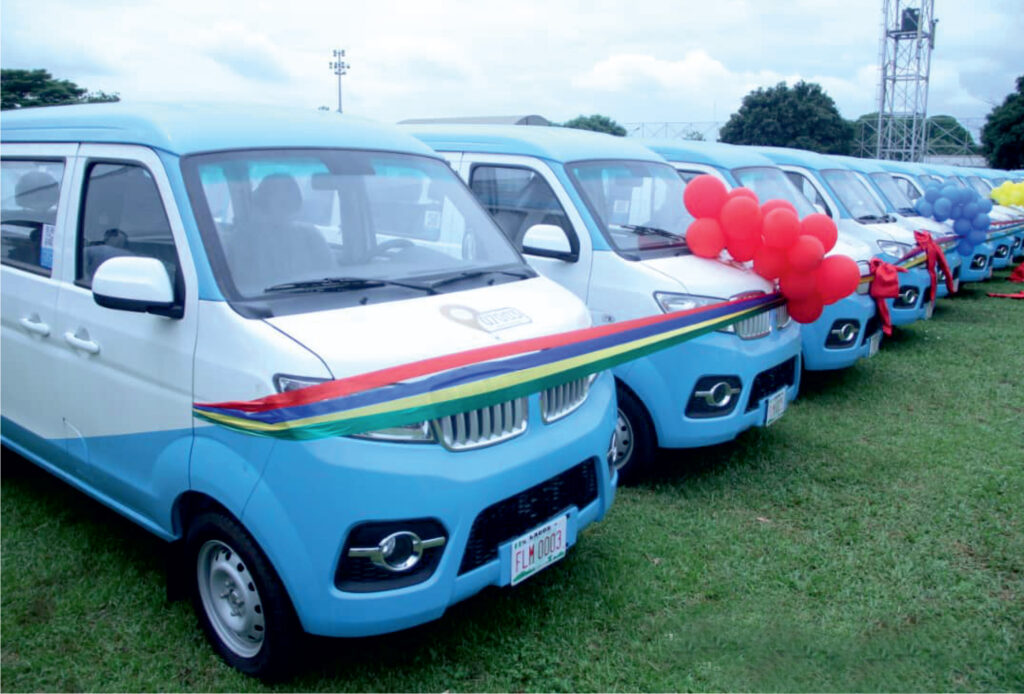
He hoped that the projects would improve the socio-economic activities of millions of people who live, do business, or use it to connect their various destinations.
The administration has also constructed and rehabilitated several inner roads in the 20 Local Government Areas and 37 Local Council Development Areas, LCDAs. It also commissioned the Oshodi-Abule Egba BRT corridor and rehabilitated the Agric-Ishawo Road in Ikorodu and the four junctions’ improvement projects at Allen Avenue, Maryland, Ikotun and Lekki. The Eleko junction to Epe concrete pavement road construction has been completed.
More importantly, as soon as he assumed office, Sanwo-Olu revived work on the Lagos-Badagry Expressway, which had been abandoned by his immediate predecessor. He mobilised the contractors to return to site. The first phase of the project from Mile 2 to the old Volkswagen area has since been completed and commissioned.
Within 24 months, the government completed the elevated sea-crossing track of the Blue Line Mass Transit Project at Marina and shortlisted eight firms for the construction of the 4th Mainland Bridge.
The jaw-dropping Intelligent Transportation System, ITS, at the Ikeja and Oshodi Bus Terminals have been completed. They were commissioned by President Muhammadu Buhari last year.
Sanwo-Olu’s Smart City campaign aims at giving a fresh impetus to water transportation in Lagos. Early last year, he launched eight newly acquired speed boats as part of the Lagos Ferry Services, LAGFERRY. Tayo Ogunbiyi, Deputy Director, Public Affairs, Ministry of Information and Strategy, said all the boats were designed and built by local manufacturers in line with the governor’s promise to explore local capacity in providing solutions to various challenges in the state. All the boats had in-built Wi-Fi and other modern devices that aid smooth sailing.
Three of them have capacity to carry 60 passengers; two, 50 and the rest 40 each along Ikorodu – Falomo, Ikorodu – Ebute Ero – Marina, Ebute Ojo – Ijegun Egba, Apapa – Marina, Bayeku – Oke Ira Nla – Falomo, Mile 2 – Marina and Badore – Ijede routes. “The intervention represents a remarkable way forward in the strategy to deliver an effective and integrated inter-modal transportation system in addressing the perennial issue of traffic congestion on the roads,” said Ogunbiyi.
The Lekki Deep Seaport project is close to Mr. Sanwo-Olu’s heart. The THEMES plan promised a megacity that is a 21st century economy. This propelled the administration to sign a $629million financing facility aimed at completing the project. “When that project is completed, Lagos will have one of the most modern and capable ports not just in Africa but in the world,” the governor said.
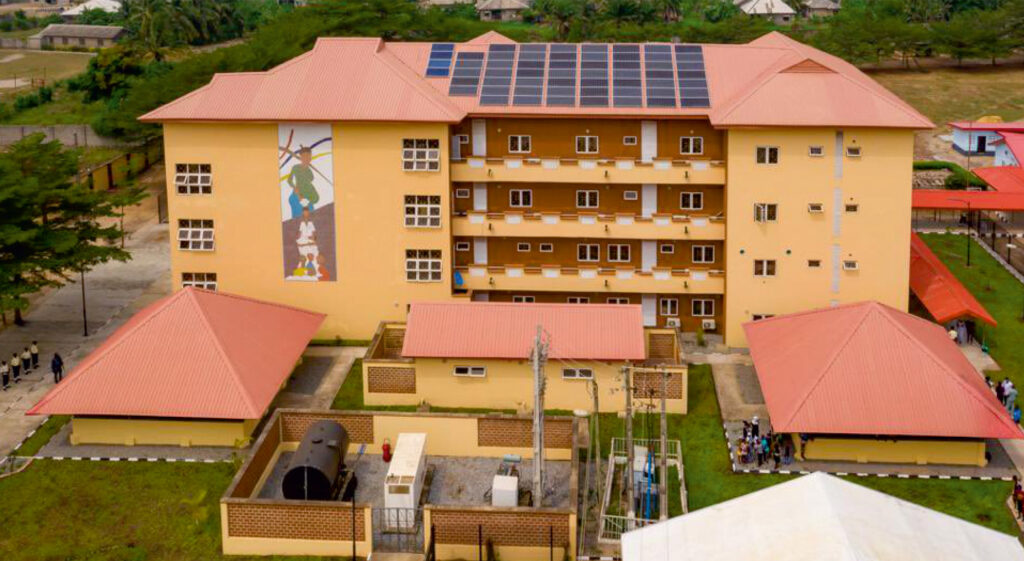
The Lekki Deep Seaport project is close to Mr. Sanwo-Olu’s heart. The THEMES plan promised a megacity that is a 21st century economy. This propelled the administration to sign a $629million financing facility aimed at completing the project. “When that project is completed, Lagos will have one of the most modern and capable ports not just in Africa but in the world,” the governor said.
Health and the environment have taken a pride of place since the new governor came on board. With 608.09 square kilometres of its total land mass of about 3,577 square kilometres coming under “aquatic splendour,” Lagos State deserves an efficient management of its ocean, rivers, lagoons and creeks. In this respect, Mr. Sanwo-Olu has initiated a programme on constant clean-up of waterways to enhance a cleaner and aesthetic environment. It involves regular collection of floating waste/refuse from blocked channels and coastal areas with a view to preventing flooding.
Under LAWMA’s Marine Waste Services, the government is collaborating with the Food and Beverage Recycling Alliance, FBRA, to ensure refuse, litter free shorelines by evacuating empty bottles and clearing of water hyacinth. For effective performance, LAWMA acquired 10 new boats. The FBRA donated six recently for this purpose.
The programme has engaged youths within the riverine and poor communities to increase employment generation of the State for improved per capita income. It has helped in preserving aquatic flora and fauna in the State; provided suitable environment for marine and eco-tourism as well as preserved storm water in-let into the lagoon and creeks.
The latest in LAWMA’s efforts is the Construction, Demolition and Disaster Waste, CDDW, management. The target here is to ensure that all waste streams are captured from sites. On September 5, 2019, Sanwo-Olu launched the Lagos Blue Box Initiative. Community Recycling Centres were activated in Local Council Development Areas (LCDAs), with recyclers strategically positioned to help drive the process. The communities where the programme has been established include Lekki, Oshodi-Isolo, Iru in Victoria Island, Lagos Island, Ikeja, Surulere and Ijora-Olopa.
Under the initiative, the government aims to divert about 40 percent of waste generated at the household level from the dump sites. About 340,050 bags have been distributed to various households to enable them sort recyclable waste. Instructively, LAWMA undertook advocacy and sensitization campaigns at different levels for residents including children who were identified as change agents.
Also, LAWMA’s street sweeping and highway sanitation have continued with renewed vigour and deployment of sweepers across the three senatorial districts of the State. Currently, the Authority has 6,743 sweepers and 219 supervisors. It equally incorporated physically-challenged persons into the drive by assigning them to clean pedestrian bridges. This has not only improved cleanliness of pedestrian bridges but also the means of livelihood of the special sweepers.
The current administration has invested massively in the health sector. In its formative months, the government began a Free Medical Mission for 21,000 persons across the state. They were screened across seven centres for six days, while 1,417 free pediatric and adult eye surgery; dental, orthopaedic and ENT (Ear, Nose and Throat) surgeries were conducted for residents.
Another free surgical intervention programme for residents was organised in partnership with a non-governmental organisation, NGO, Benjamin Olowojebutu Foundation. It comprised free dental and general health surgeries for residents suffering from lipoma, hernia, fibroid and breast lumps.
The reform in the health sector has been steady these past two years. Notably, within Sanwo-Olu’s first 100 days in office, he had completed and commissioned a 110-bed Maternal and Child Centre, MCC, in Eti Osa. Not long after, he declared open the 149-bed MCC in Alimosho General Hospital, Igando.
Last January, he commissioned well-equipped health facilities in Badagry and Lekki. The Akran of Badagry, De Wheno Aholu Menu Toyi I, led traditional rulers and residents of his community to the opening of the Badagry General Hospital’s School of Anaesthesiology, a 110-bed MCC and the 252 units of two bedroom flats to accommodate the people of Idale community.
At the commissioning ceremony, Governor Sanwo-Olu said: “This is just a testimony to our assurance to the people and our commitment to deliver quality projects that will turn around the lives of our citizens. Not only that the MCC we are handing over for public use today has an emergency service; it also caters for obstetrics and gynaecology. There are also laboratory, radiology, pediatrics and immunisation departments.” To further ease access to the MCC, the governor announced the construction of the 5.5 kilometre road that leads to the General Hospital.
Prof. Akin Abayomi, Commissioner for Health, said that the Badagry MCC had been activated after its completion in November 2020 and that it had already delivered healthcare services to over 3,000 outpatients and 600 children with 49 successful caesarean deliveries.
Against the background that about 95 percent of Nigerians are still not covered by the Nation’s health insurance scheme and are unable to access affordable quality healthcare delivery, last May, Mr. Sanwo-Olu launched ‘Ilera Eko’ to achieve universal health coverage for all Lagosians by the end of 2021. Three months later, he and Deputy Governor Obafemi Hamzat launched the Mother, Infant and Child, MICH, programme, to improve maternal and child condition. The event held at the Adeyemi Bero Auditorium, Alausa, Ikeja, attracted over a thousand mothers and their babies. The governor explained that through the initiative, the government will reach out to 5,000 indigent pregnant women and cater for them throughout pregnancy.
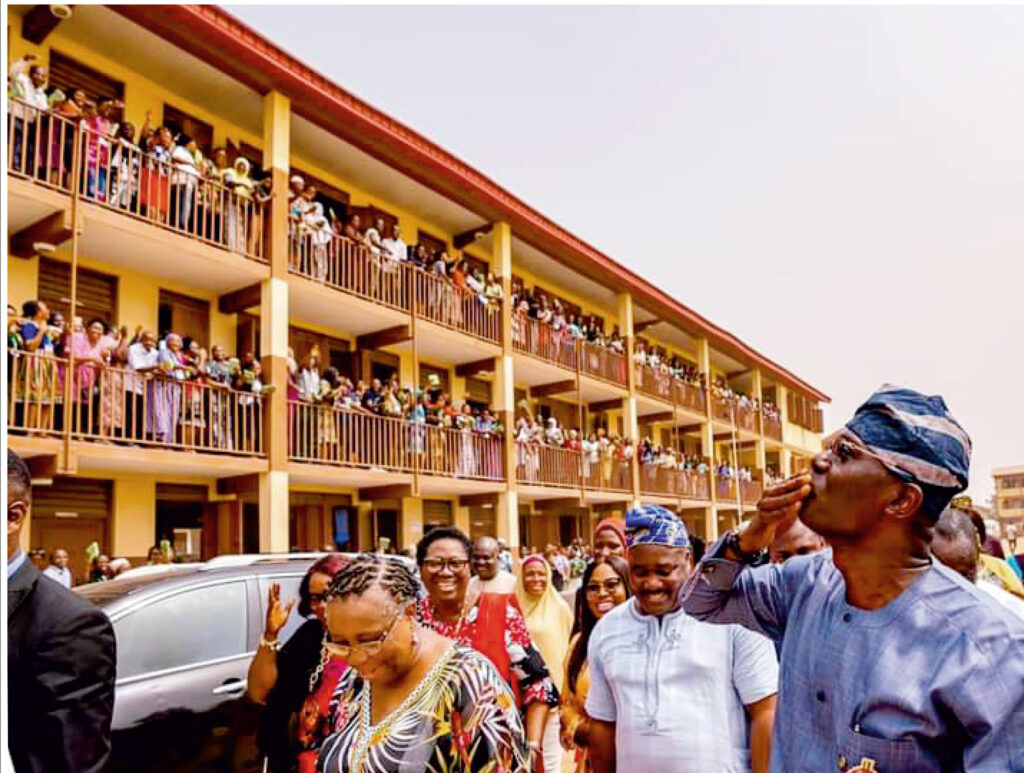
To access the programme, selected beneficiaries would be issued approved MICH Collection Cards individually for the government to monitor the distribution of nutrient-filled supplements on a weekly basis. Such pregnant women would follow-up through home visits by a dedicated team of public and state-approved community health workers and medical consultants. “The process of bringing life into existence should no longer lead to the loss of another life,” Sanwo-Olu said.
MICH has taken off in flagship health centres in Ikeja, Badagry, Epe, Ikorodu, Agege, Lagos Island, Eti Osa, Alimosho, Somolu. Kosofe and Ibeju.
In the last two years, the Government has been battling to rid Lagos streets of the menace of beggars and hawkers. The Sanwo-Olu Administration is tackling the menace head-on. It set up a Special Task Force to curb the illicit ventures under which many criminals hide somewhere to attack motorists and other residents. At a press conference attended by the Commissioner for Information and Strategy, Mr. Gbenga Omotoso, and Lagos State Commissioner of Police, Mr. Hakeem Odumosu, Commissioner for Youth and Social Development, Mr. Olusegun Dawodu, said that setting up the task force became necessary to “sanitise the society and restore the dignity of those who have been sent into the streets for alms begging and hawking.” The special team has since commenced operations.
According to Dawodu, the plan to stop street begging was based on intelligence reports that some of the “so-called” beggars go about with dangerous weapons, assault and rob innocent Lagosians. To tackle the menace, the government has maintained a Rescue Unit saddled with the responsibility of rescuing and protecting the destitute and the vulnerable. Those taken off the streets will be rehabilitated in government correctional centres for treatment and vocational training to make them useful to themselves and the society.
The 8th Lagos Economic Summit, otherwise known as ‘Ehingbeti,’ which was held between February 16 and 18, 2021 was, appropriately, Sanwo-Olu’s launch pad for ‘Making Lagos a 21st Century Economy,’ a critical aspect of the THEMES template. With the theme ‘Discussing Issues Critical to Development of the Mega City,’ the three-day event attracted about 146 speakers, over 15,000 registrations and 6,000 participants from across the globe. The Summit examined six thematic areas of importance including: destination Lagos: shaping-up as the world’s best investment destination; strengthening governance institutions and legislations; Fourth Industrial Revolution: imperatives and prospects for a decent economy; roadmap for a shared economy: ensuring inclusive human capital development; funding growth sustainably and sustainability resilience and impact.”
Sanwo-Olu was elated as he espoused his economic plan: a network of 6,000 kilometres of fiber optic infrastructure, a wide network of colour-coded Metro Lines that would be moving over 34.5 million people monthly and cutting travel time by over 250 per cent; a network of intelligent cameras, the largest rice mills in the world and a medical park. He was ecstatic about the values these will bring to the state: millions of direct jobs for skilled youths and empowerment of women.
He told the forum that the race to leverage technology to revolutionize business in every community in Lagos had begun with the ongoing laying of the fibre optic infrastructure across the city. His words: “In 2030, Lagos will proudly stand beside every other megacity in the world in terms of its capacity to transport its people efficiently and responsively.
“The Smart City that is unfolding will also be home to a network of intelligent cameras that will support not only security and policing across the State, but also traffic management and data collection for urban planning. By 2030, Lagos will be home to one of the largest Rice Mills in the world, after we deliver our 32 metric tons per hour rice factory in Imota, which will produce 2.8 million bags of 50kg bags of rice per annum.”
Sanwo-Olu made good use of the forum since it brought together, virtually, those critical to the delivery of the grand Greater Lagos project including President Muhammadu Buhari, Dr. Ngozi Okonjo-Iweala, Director General of the World Trade Organisation, WTO; Dr. Akinwunmi Adesina, President of the African Development Bank, AfDB; Mr. Mohammed Ibrahim, founder of the Mo Ibrahim Foundation, and other experts and technocrats.
President Buhari pledged that the Federal Government will continue to invest in Lagos in order to boost the State’s economic potential as one of the world’s fastest growing megacities. “The Federal Government is today completing the standard gauge railway line that links Lagos to Ibadan in the first instance, and from there connects to Abuja and Kano, and brings ease and efficiency to what is Nigeria’s busiest transportation corridor,” he said, adding “Just last month, this new rail line achieved a milestone extension into the Port Complex in Apapa setting the stage for a long overdue decongestion in that area.”
He praised the State Government for its cordial relationship with the national government to the advantage of the citizens and cited the concession granted it to rebuild the federal highway leading to the Murtala International Airport, Ikeja.
Dr. Adesina delivered a keynote address at the Summit with the theme ‘Building the wealth and prosperity of Lagos for a Better Future.’ “The future of Lagos,” he said “must be knowledge-based and the State Government must sustain its investment in education to produce knowledgeable, skilled young people for the jobs of the future.”
On her part, Dr. Okonjo-Iweala called for the creation of massive industrial hubs to harness the potential of the youth and women in artificial intelligence and digital economy. She commended Sanwo-Olu’s plan to build digital infrastructure around the city, noting that the optic fibre programme makes the State a new manufacturing hub of digital products and would shape the global economy in the next decade.
At a news briefing during the Summit, Sanwo-Olu used the opportunity to explain the third pillar of THEMES which is Education and Technology. He said he was building the backbone for metropolitan optics fibre. “We are building 3,000 kilometres of fibres around Lagos. We have done 1,800 kilometres as we speak now. By June 29, I would be commissioning direct fibres in 100 schools. We would have connectivity to all of our hospitals. We are building the backbone for our private sector to come in; MTN, 9Mobile, Airtel for them to be able to deploy their last mile in one year from today, we have given them the capability.
“We have two sub-marines that are going to land in the next three to four months; we are giving them the capacity to be able to do it. Data and fiber is the next hub. So, Lagos is getting ready for that.
“We are building a security system. We have deployed over 150 cameras, which we are going to launch by June 29. We are going to 2,000 cameras.”
When benchmarked against promises made in his inaugural speech, Sanwo-Olu has delivered in the education sector, such that today, evidence on ground shows strong teaching and learning infrastructures to make Lagos schools 21st century compliant. About 350 schools including 96 primary schools have been overhauled. The administration has added about 300 new classrooms to existing ones. Now, for the first time in 15 years, the Lagos State Government is building three new schools from the scratch. “We are not leaving the primary schools to the State Universal Basic Education (SUBEB) and we are not saying because it is with Federal Government or Universal Basic Education Commission (UBEC). We are doing it directly with them,” the governor said.
In the last two years, the state has employed 2,000 Primary and 1,000 Secondary School Teachers to increase the number of teaching personnel, especially in some core subjects. Alongside this, the government has improved capacity and welfare of school personnel with funds disbursed for car refurbishment and housing loans to teachers. Under the Home Grown School Feeding Programme, 135,445 pupils were fed daily across 976 public primary schools.
The private school sector equally received attention. A Public Private Partnership (PPP) Dialogue on education was organised aimed at improved quality and commitment to educational development in the state.
During the Covid-19 pandemic, the State organised electronic learning and teaching platforms through radio, television, and the internet media. Online seminars were developed for teachers to enhance their 21st century capacity and capability. Two new buses and office equipment were provided for Quality Assurance Officers for monitoring of primary schools. Public Primary School Vocational Centres got consumables such as office equipment, arts and crafts materials. Libraries and ICT centres have been renovated in Secondary Schools across the State Education Districts. About 18,000 Secondary School Teachers were trained in digital literacy by Microsoft. They were trained in Scenario planning based on Remote learning teaching classroom coordination post Covid-19 measures.
About 250,000 new benches and chairs have been supplied to schools. The administration has also improved admission and bed spaces in model schools with about 2,000 new bed spaces built for model schools to enhance boarding facilities.
At the tertiary level, the sum of N253million was paid as bursary awards for 8,246 beneficiaries through the State Scholarship Board. Another sum of N190million was paid as scholarship awards to 845 beneficiaries. Government has concluded with some private developers to ensure that the Lagos State University, LASU, becomes a residential institution.
Last month, Sanwo-Olu fulfilled his 2019 promise to provide houses to two teachers who bagged the best teacher award and best school administrator in the 2019 President’s Teachers and Schools Excellence Award (PTSEA) respectively. The governor, who was represented by the commissioners for education and housing, Folasade Adefisayo and Maruf Akinderu-Fatai respectively, presented the keys to a two bedroom flat to the family of late Pius Ikuseyidunmi, a former principal of Government Junior College, Ketu, Epe for emerging the best school administrator.
A three bedroom apartment was presented to Agnes Elusakin, a former teacher at Oriwu Senior Model College, Ikorodu and now the principal of Community Junior Secondary School. She won the best teacher award in the country in 2019. According to Mrs Adefisayo, the feat was a testament to the improved infrastructure and manpower of the education sector in the state. “You have transported Lagos State to national levels and beyond and I encourage all teachers to always stay focused, determined and continue to learn new methods of cascading knowledge as the government will not reduce the standard of learning in schools,” she said to the teachers, adding “We are doing everything possible to provide quality education in Lagos State and the narrative of education is changing as the government is touching every school regardless of location.”
In 2019, three teachers, representing Lagos State- Mrs Elusakin, Mr. Ikuseyidunmi, as well as Oluwasegun Adeniyi of Caleb British International School, Abijo-Lekki, had excelled at the 2019 President’s Teachers and Schools Excellence Award (PTSEA) for exemplary performance in the education sector. Elusakin who won the best teacher, public senior secondary school in Nigeria Award was presented with a brand new car during the award ceremony in Abuja. Mr Ikuseidunmi got a freezer and laptop for emerging the best junior secondary school administrator in Nigeria in 2019.
This year, the state has also recorded success in the annual award ceremony which was held on October 5, as part of activities marking the World Teachers’ Day. Bolade Junior Grammar School, Oshodi, emerged the best public secondary school in the country while two teachers, Temitope Obiwumi of Wahab Folawiyo Junior Secondary School and Rasheed Odenike of Lagos State Civil Service Senior Model College, Igbogbo, Ikorodu, emerged second runner up as the best teacher in Junior Secondary School in Nigeria and fourth best teacher in Senior Secondary Schools categories respectively.
Bolade Junior Grammar School in Oshodi was presented with a certificate and a bus, while Mrs. Obiwumi, who also won the best teacher award during Lagos State Y2020 Teachers’ Award, got a certificate, a laptop and a fridge. Mr Odenike, who also won the best teacher award in 2020, was presented with a certificate and a fridge.
On July 1, 2021, Governor Sanwo-Olu presented to the public his Tourism Master Plan and Policy to provide a more holistic approach to the implementation of tourism activities across the State such that there will be uniformity and orderliness in this sector. He disclosed that the policy was developed with the consent of relevant stakeholders in the tourism industry, noting that it was reviewed to reflect the policy thrust and plans for the Entertainment and Tourism pillar of the THEMES Agenda.
Deputy Governor Hamzat who represented him at the event described the package as a critical step to further unlock aspects of Lagos towards becoming Africa’s tourism giant. “Since we assumed office, over two years ago, we have taken decisive steps to explore the abundant possibilities in this very critical sector by allowing the practitioners and key stakeholders to be directly involved in our policies,” he said.
The policy document will direct efforts in the tourism sector in six strategic areas: Culture and Heritage; Film, Art and Entertainment; Business and Meetings, Incentives; Conferences and Entertainment; Beach and Leisure; Nature and Adventure; and Medical and Wellness. Sanwo-Olu said it will help in the attainment of a robust execution and implementation of short, medium and long-term plans in different areas and aspects of Tourism activities in alignment with the vision to revamp the tourism sector holistically, adding that the waterways and beaches for tourism purposes, as well as restaurants, recreational parks, relaxation centres will be exposed at home and abroad.
Alhaji Lai Mohammed, Minister of Information and Culture, who was represented at the event by the Director General, Nigerian Tourism Development Corporation, Mr. Folorunsho Coker, said it was time for all tiers of government in the country to align policies in the area of taxation and legislation. “This is the time for collaboration and not a competition between all tiers of government; if there is competition between members of the State and Federal on issues relating to tourism the progress will be distorted,” he said.
Uzamat Akinbile-Yusuf, Commissioner for Tourism, Arts and Culture, stated that the master plan will explore and promote the potential that abounds in the State, as well as integrate the thriving Entertainment and Arts industry as a viable platform to attract visitors and create jobs. She noted that the 20-year document was conceived with the vision “to make Lagos State one of the top five urban tourism destinations in Africa and recognised as the face of art in Africa for its multiple creative and innovative tourism products and experiences.”
Under the plan, the Ministry will train 500 youths from the five IBILE Divisions of the State as Tour Guides as well as train creative practitioners under its Lagos State Creative Industry Initiative, LACI. Aside the above, the state government is revamping the National Arts Theatre in partnership with a consortium of banks. “Over the next two years, we are looking at spending close to N30billion on this project. Apart from National Theatre, we are building a Fashion Academy, a Tech Academy and a Music and Entertainment Academy all around Iganmu. That is where we believe the energy of raw talent in our midst can manifest and be fine-tuned for success,” the governor said.

Before now, the government had renovated and added new facilities to the Glover Memorial Hall, Lagos, to enable it empower and engage more practitioners in the creative industry. The new complex was commissioned on March 3, 2021.
Also, the redevelopment of the J.K. Randle Centre for Yoruba and Culture, Onikan, is almost completed. The state-of-the-art facility will complement other cultural and historical edifices like the National Museum, MUSON Centre, Freedom Park and City Hall, among others, to create a cluster of attractions and stimulate local economy.
In the sporting arena, the administration has improved existing facilities as well as started building new ones. The Mobolaji Johnson Stadium, Agege, Teslim Balogun Stadium, Onikan and Rowe Park, Yaba, are being upgraded while 10 mini stadia are under construction. These will be completed before the end of the first quarter of 2022.
Through the Agricultural Value Chains Enterprise Activation Programme, Mr. Sanwo-Olu has trained over 12,000 women and youths in the State and empowered them across the several value chains.

In the social welfare sphere, the governor has reached out to the people with various incentives to boost their standard of living. A monthly allowance of N40,000 is paid to 4,000 unemployed graduates. Grants and financial support have been provided to business owners especially in the wake of the Covid-19 pandemic which negatively impacted on many businesses including MSMEs.
In the N1.160 trillion 2021 budget, for example, N76billion of the capital expenditure was earmarked for the youths. “It is for and about what they stand for. Be it education, job creation, technology, sports, communication from one location to another, public transportation, things around health. It is really speaking to that youthful population,” the governor noted.
And he added: “If you look at all of our proposed expenditure for 2021, we are deliberately looking at helping small businesses grow, empowering the youths and also using the various youth organisations as an enabler to bring them closer to government and listen to them. We are encouraging them to share their views on what we should be doing and doing differently.
“This way, we can achieve the targeted intervention coming for them. The funds are there, we have made provisions; Office of Civil Engagement, Office of Sustainable Development Goals, Youths and Social Development Office, all of these offices are looking to youth’s engagement at different levels.”
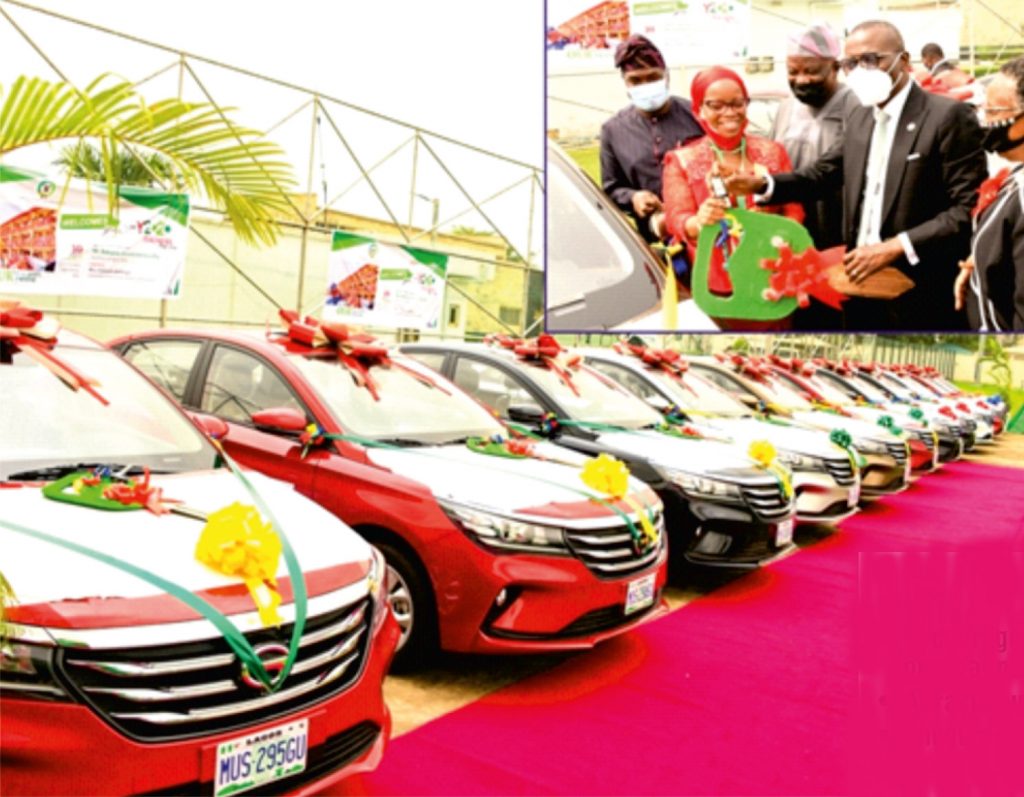
In the housing sector, Mr. Sanwo-Olu has built 132 units of apartments at Iponri area under the Surulere housing project. The houses were commissioned in January 2021. He has built another 84 housing units at Ikota, along Ajah Corridor, Lekki Phase II. The house project was named after former Governor Babatunde Raji Fashola. The governor said the housing project was designed with eco-technology and EDGE Advanced protocol that will also be adopted in building the proposed Workers’ Village in Ipaja.
Governor Sanwo-Olu believed that he could have delivered more dividends of democracy in line with the “Sanwo Eko” clamour by Lagosians two years ago but for two major catastrophes – the Covid-19 pandemic and #EndSARS disaster. When the Covid-19 pandemic spread to Nigeria, Lagos was the epicentre. Consequently, it had the highest testing centres and in the beginning did up to 4000 tests daily.
And in the #EndSARS imbroglio, the state was worst hit, losing properties worth over N1trillion to miscreants who wantonly torched public and private buildings and mass transit buses. “It is going to take a lot of psychological change for us to get that image out of our system,” he told ThisDay Style in an interview. “The damage has been of varying degrees around different sectors. The toll gate for instance, will need some measure of reconstruction over a process which has not started. Take the Judiciary where we have about 25 High Court Judges who do not have a place to sit; we have about 20 Magistrates that do not have a place to seat. What we have done very quickly, is to identify some of our newer buildings that we are converting to courts.”
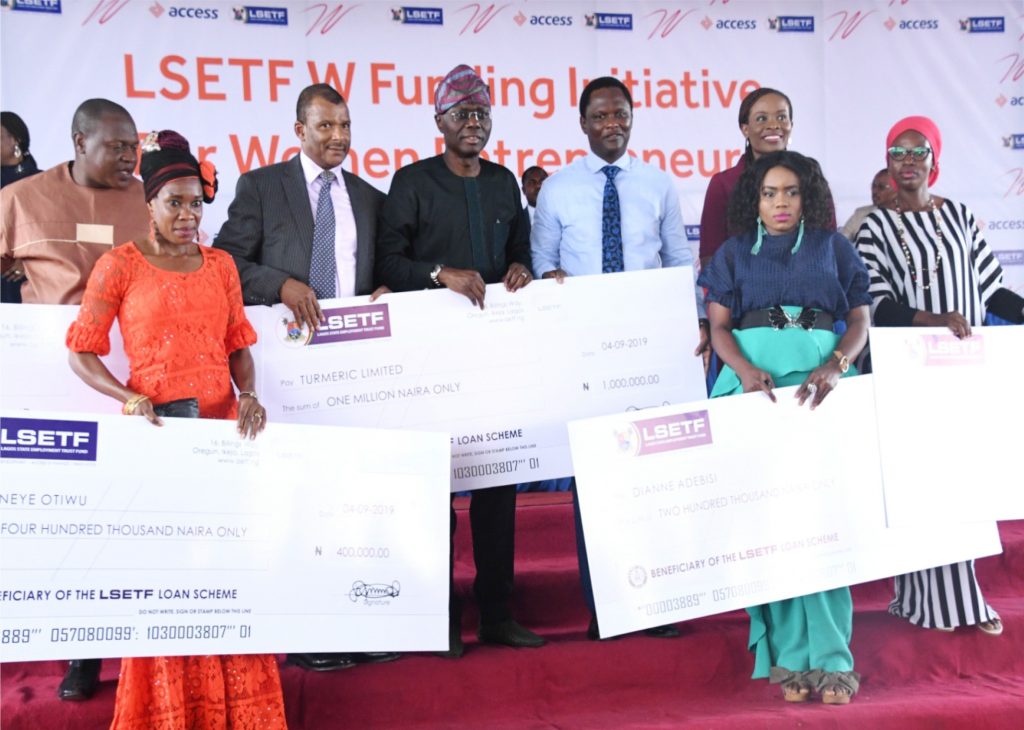
Till date, the Sanwo-Olu administration is yet to recover from the crisis. There are Government offices that have not been renovated but the state has helped few police stations with containers to be converted for their use. “For businesses, what we have done in direct collaboration with the private sector, is to focus on the small to medium scale businesses that we can help with grants ranging from as low as N5,000 to as high as N5 million,” he said.
To guard against derailment from the THEMES Agenda, the government set up the seven-man board Lagos Rebuild Trust Fund with members drawn from the private and public sectors. Dr Yemi Cardoso, former head of Citibank heads the fund. Other members are Mr Agboola of Flutter Waves; Mr Abubakar Sulaiman, managing director of Sterling Bank; Prof. Koyinsola Ajayi and Mrs Bola Adeshola who also chairs the Lagos State Trust Fund. And for interface, the governor added the Commissioner of Planning and Budget as well as the Permanent Secretary in the Office of Infrastructure.
Its main task is to look at the entire rebuilding cost and raise private sector funds in addition to budget provision by government.
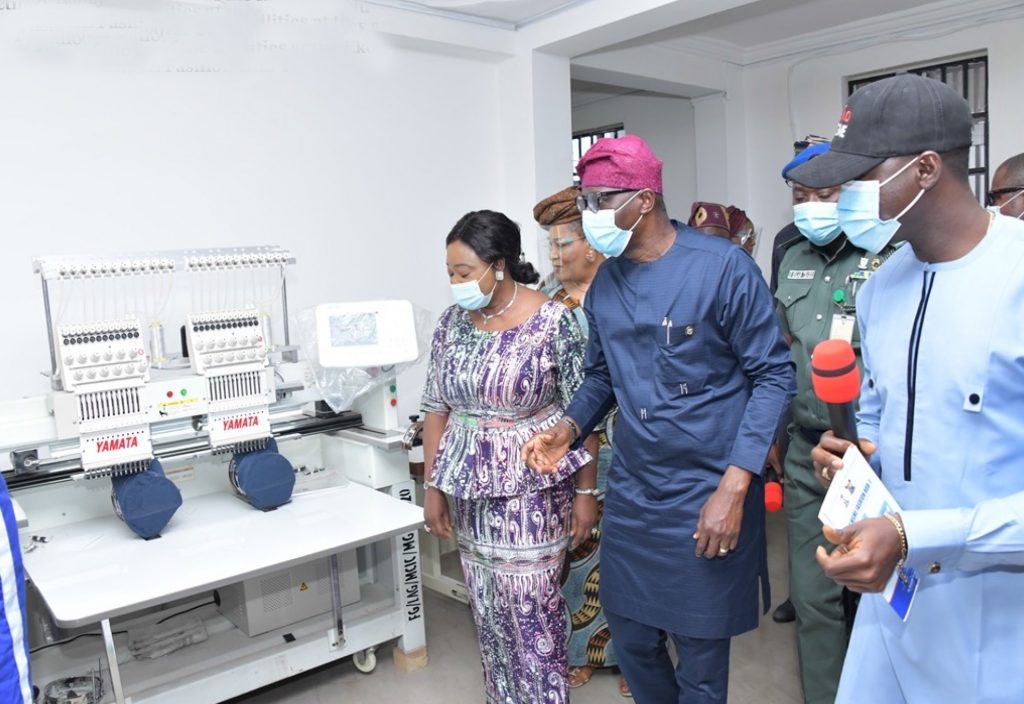
As Mr. Babajide Sanwo-Olu trudges on to do more in the third year of his first term in office, he acknowledged that indeed, the journey has not been smooth sailing. “I am not going to sit here and say to you that it is a tea party and everything is well; sincerely it is not,” he said. But he added emphatically: “I can tell you that I come to this job with the sincerity of heart to make this place a lot better than I met it. In that journey, yes, I might have made some mistakes. I might have hit some people wrongly but that is the only way I can get up, fix it and make it work again.”



